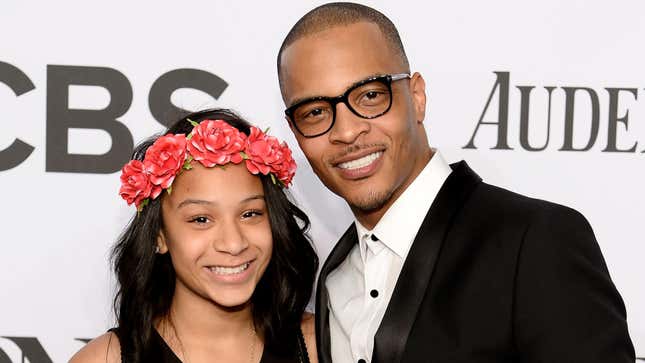
Yesterday, the entire internet collectively rolled its eyes as Clifford “T.I.” Harris attempted to use yet another word he clearly doesn’t understand when he bragged about his 18-year-old daughter Deyjah Harris’ hymen on Nazanin Mandi and Nadia Moham’s podcast, Ladies Like Us. The three found humor in the moment T.I. explained that he takes Deyjah to the gynecologist to ensure that her hymen is intact, a cringe-worthy reminder that society’s overall approach of centering reproductive health around virginity is where so many parents have failed their children. However, I see this ignorance often.
For T.I. to use his platform to be so loud and so wrong is not shocking, especially when moments like his past rant referring to his wife’s vulva as the “uvula” are more than enough proof that he should have no dealings in any woman’s sexual health (let alone pleasure, poor Tiny). Yet terminology isn’t the only thing Tip got wrong here; he also managed to prioritize virginity over adequate healthcare and gave a sorry ass example of consent by essentially coercing Deyjah to permit both his presence and his access during her appointment.
Within hours of the initial reports from Buzzfeed and Madame Noire, Deyjah and her hymen were trending. Timelines were flooded with conversations about virginity and parental boundaries, but I managed to find inspiration in T.I.’s flawed approach. Once I got past the initial shock and disappointment of his invasive tactics, I was reminded that my job as a parent isn’t to scare or intimidate my child about her sexual health but to empower and educate her.
I am a reproductive justice activist and an adolescent health educator, but I’m also a black mama. I decided to schedule an appointment at the gynecologist with my own 13-year-old daughter for my upcoming routine pap smear. And while there is damn sure no hymen for them to find, she can get an in-person tutorial and clear understanding of what to expect when she starts receiving gynecological care. This way, rather than solely relying on society and the curriculum at school that both center sexual health around stigma and virginity, she will be properly informed. Nobody’s introduction to a vaginal exam should be when they’re on the other end of the speculum and they certainly shouldn’t be used as a tool to determine someone’s “purity.”
Sure, seeing her mama in stirrups with my bare ass hanging off the exam table isn’t exactly how she imagines a day of skipping school, but I’m hoping to get more from this visit than the annual scraping of cells from my cervix. While I’m sure there will be awkward moments to be had, I hope that this will be a time and space for my daughter to learn about all of the amazing things that contribute to our sexual and reproductive experiences.
It’s extremely important to me that my child has a full understanding of her body’s anatomy. For example, she should know that her vulva and uvula are nowhere near each other, but most importantly, she will walk away knowing her reproductive system and its functions. This a key component to understanding her sexual health throughout life, as her reproductive system will hold such a key role in every stage, from menstruation and urination to sex and menopause.
Our children having a lack of knowledge and understanding about their body is dangerous, but minimizing their bodies to platforms for our own personal views is toxic and does them no justice. I personally spent a majority of my adolescence misinformed and thinking that my vagina was simply the host of my virginity, my hymen was its gatekeeper and that my clitoris was just there and in the way, and our children deserve so much more than that.
But after about 10 minutes of scrolling through Twitter, I realized I wasn’t alone. I was reminded that so many of us survived the same as tweet after tweet revealed similar ideas and approaches to sex in black households. This led to me remembering the very uncomfortable moment at 14 when my father referenced my virginity and hymen as the “family jewels,” followed by a loose warning not to let anybody “rob his jewelry store.” And while little did he know at that moment he had already been robbed blind, the conversation led to a pit of guilt that I let someone touch something that “belonged” to my father.
Thanks to virginity stigma, we set the tone early that our children’s bodies belong to their parents first and their partners later, but where’s the conversation about their bodies being their own?
This is why visits to the gynecologist are also teachable moments for bodily autonomy—affirming consent over their body without coercion (ahem, Clifford)—and their rights regarding consent. Our visit to the doctor will also show my daughter a healthy example of explicit permission and serve as a crash course in her rights as a patient.
These are practices that you can put in place prior to provider visits for sexual health. If our children and teens are visiting their pediatricians or primary care providers, allow them a few minutes with the provider to discuss topics or issues they may not be comfortable addressing in front of you.
Our children don’t deserve to be left with the task of teaching themselves about their health or through hard life lessons. And T.I. damn sure doesn’t need to be holding his daughters’ hymens hostage; it suggests it’s an acceptable approach to parenting and sex ed—and it’s nasty as hell.
Brandi Collins-Calhoun is a menstrual maven, pleasure-positive baby mother and birth worker writing and critiquing culture through a reproductive justice lens.

